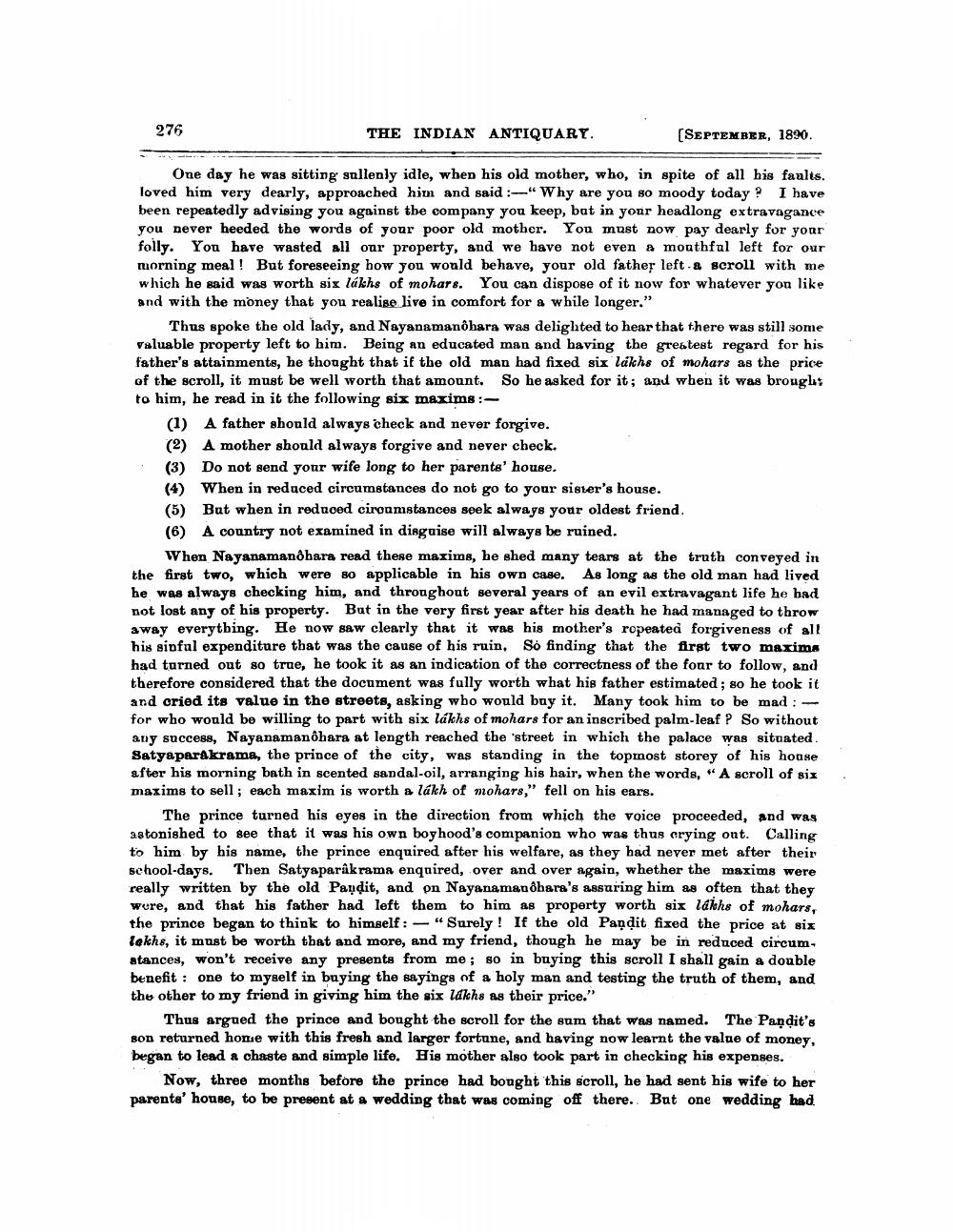________________
276
THE INDIAN ANTIQUARY.
(SEPTEMBER, 1890.
One day he was sitting sullenly idle, when his old mother, who, in spite of all his faults. loved him very dearly, approached him and said: "Why are you so moody today? I have been repeatedly advising you against the company you keep, bat in your headlong extravagance you never heeded the words of your poor old mother. You must now pay dearly for your folly. You have wasted all our property, and we have not even a mouthful left for our morning meal! But foreseeing how you would behave, your old father left. & scroll with me which he said was worth six lakhs of mohars. You can dispose of it now for whatever you like and with the money that you realise live in comfort for a while longer."
Thus spoke the old lady, and Nayanamanôhara was delighted to hear that there was still some valuable property left to him. Being an educated man and having the greatest regard for his father's attainments, he thought that if the old man had fixed six lakhs of mohars as the price of the scroll, it must be well worth that amount. So he asked for it; and when it was brought to him, he read in it the following six maxims :
(1) A father should always check and never forgive. (2) A mother should always forgive and never check. (3) Do not send your wife long to her parents' house. (4) When in reduced circumstances do not go to your sister's house. (5) But when in reduced circumstances spek always your oldest friend. (6) A country not examined in disguise will always be ruined.
When Nayanamandhara read these maxims, he shed many tears at the truth conveyed in the first two, which were so applicable in his own case. As long as the old man had lived he was always checking him, and throughout several years of an evil extravagant life he had not lost any of his property. But in the very first year after his death he had managed to throw away everything. He now saw clearly that it was his mother's ropeated forgiveness of all his sipfal expenditure that was the cause of his ruin. Só finding that the first two maxima had turned out so true, he took it as an indication of the correctness of the four to follow, and therefore considered that the document was fully worth what his father estimated; so he took it and cried its value in the streets, asking wbo would buy it. Many took him to be mad :for who would be willing to part with six lakhs of mohars for an inscribed palm-leaf ? So without any success, Nayanamanôhara at length reached the street in which the palace was situated Satyaparakrama, the prince of the city, was standing in the toprnost storey of his house after his morning bath in scented sandal-oil, arranging his hair, when the words, "A scroll of six maxims to sell; each maxim is worth a lákh of mohars," fell on his ears.
The prince turned his eyes in the direction from which the voice proceeded, and was astonished to see that it was his own boyhood's companion who was thus crying out. Calling to him by his name, the prince enquired after his welfare, as they had never met after their school-days. Then Satyaparak rama enquired, over and over again, whether the maxims were really written by the old Pandit, and on Nayanamanôhara's assuring him as often that they were, and that his father had left them to him as property worth six lakhs of mohars, the prince began to think to himself: - “Surely! If the old Pandit fixed the price at six lakhs, it must be worth that and more, and my friend, though he may be in reduced circumstances, won't receive any presents from me ; so in buying this scroll I shall gain a double benefit: one to myself in buying the sayings of a holy man and testing the truth of them, and the other to my friend in giving him the six idkhs as their price."
Thus argued the prince and bought the scroll for the sum that was named. The Pandit's son returned home with this fresh and larger fortune, and having now learnt the value of money, began to lead a chaste and simple life. His mother also took part in checking his expenses.
Now, three months before the prince had bought this scroll, he had sent his wife to her parents' house, to be present at a wedding that was coming off there. But one wedding had.




